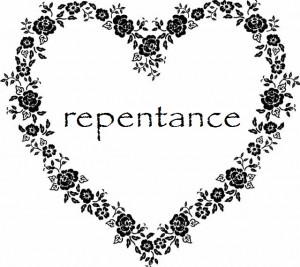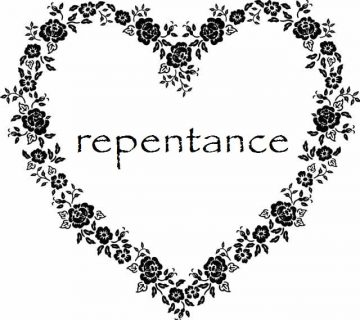This is a very broad lesson (seven sections!), and will be too much, I think, for any class to go over in meaningful detail. Having been freshly inspired by TopHat’s great Young Women lesson plan on repentance (oh, how I would have loved her lesson when I was in Young Women!), I chose to focus on repentance for this lesson.  The reason is because I think that repentance is generally taught in a manner that brings fear, sorrow and judgement: it is a downer of a lesson. Though the focus on faith and the seven (!) sections in this lesson detracts from an overt focus on repentance, I still opted to try and present repentance in a way that is peaceful and loving.
The reason is because I think that repentance is generally taught in a manner that brings fear, sorrow and judgement: it is a downer of a lesson. Though the focus on faith and the seven (!) sections in this lesson detracts from an overt focus on repentance, I still opted to try and present repentance in a way that is peaceful and loving.
Repentance is a topic that is personal. In this, it is difficult to teach without offering an ugly feeling of being judged and degrading our self worth. Indeed, some of my darkest hours are a result of self-hate for feeling unworthy and unable to repent, once even for something as minute as temporarily removing the garment to go to a ballet class! Thus, and because branches and wards can be small and gossipy, it is important for this lesson to be taught in a manner that expresses the love of the Atonement. The Atonement is love, which means repentance is love. And this, is good news. The link to the text is here.
I would be anxious to ensure the class starts on a positive note, so would write the word “repentance” on the board, and underneath, add the word “positive.” Have the women in the class list the positive characteristics of repentance. Some of the positive characteristics might be: clean, baptism, refresh, start over, uplifted, freed. In having a list that is only positive, the focus opens to a sense of the positive side of repentance, rather than the guilt and shame of imperfection. Through the lesson, be in tune when positive terms come up describing the feelings of repentance and continue to add them to the board.
What is a “Voice of Warning?” This phrase is common in LDS historiography. Neil J. Flinders wrote that the Voice of Warning has four key points: “In LDS theology the voice of warning has four components: (1) deity, who originates the message; (2) the message, which is the gospel of Jesus Christ; (3) an authorized messenger, who delivers the message; and (4) mankind, to whom the message is delivered.”
Why do you think that Joseph Fielding Smith spoke so much about and in the Voice of Warning? He was only the president of the church for two short years, 1970-1972. But he was added to the Quorum of Twelve in 1910, so would have been a General Authority during both world wards, the Korean War, and the Vietnam War (called the American War in Vietnam- ongoing when he was president of the church). Perhaps this encouraged him to invite those to repent quickly and often, in case they were subject to sudden military conscription, and therefore, potential death.
From the text:
Those who worked closely with President Smith saw that behind his stern warnings was a man with tender concern for people who struggled in sin. Elder Francis M. Gibbons, who served as a secretary to the First Presidency, was often present when President Smith considered matters of Church discipline. Elder Gibbons recalled: “His decisions were always made in kindness and love and with the widest latitude of mercy that the circumstances could justify.”
When we see sin and in ourselves and others, what are some ways we can express kindness, love and mercy, but also make firm choices for ourselves?
Share a personal story here, or ask someone to tell a brief personal story that reflects as an example of love, kindness and mercy, yet with firm convictions of what is right?
For me, a simple story is about smoking. We all know the word of wisdom forbids tobacco; my father smoked from the age of 12 until and probably a little after he was baptised in his 20’s. I never knew him to be a smoker; he married my mother in the temple. But I recall him saying once that when he saw a very unkept, smelly, woman who was selling day-old donuts – he craved and hungered for the bent cigarette smoking from her cracked mouth. He eventually died of lung cancer, decades after he quit smoking. In his death, the church members expressed love, kindness and mercy. Not one person judged his earlier cigarette habit. The firm choice I made in watching my father go through this was to never, ever, smoke. This is a reminder that repentance, when sincere, does not always equate to an easier life, or absence from struggle, especially when it comes to addiction. In addition, having faith in the Atonement to remain sin-free- is required.
Why is faith a necessary component for forgiveness?
From the text:
By faith we come to God. If we did not believe in the Lord Jesus Christ, if we had no faith in Him or in His atonement, we would not be inclined to pay any heed to His commandments. It is because we have that faith that we are brought into harmony with His truth and have a desire in our hearts to serve Him. …
… The first principle of the gospel is faith in the Lord Jesus Christ; and of course we are not going to have faith in the Lord Jesus Christ without having faith in His Father. Then if we have faith in God the Father and the Son and are guided, as we ought to be, by the Holy Ghost, we will have faith in the servants of the Lord through whom He has spoken.
I would add that this faith also invites us to have faith in the Heavenly Mother who understands as women our struggles, temptations and frustrations. Having faith in Her is as essential as having faith in Christ and The Father.
From the text:
“Faith without works is dead” —in other words, it does not exist. I think James’ meaning clearly is, “You show me your faith without your works, and nothing will result; but I will show you my faith with my works, and something will be accomplished.” Faith means action. … Faith, therefore, is stronger than belief. …
How is faith stronger than belief? How is this manifested in your life?
Consider this:
“If I sin or do wrong in any way, I can react in two ways. First is the easy way- I can justify myself. It just wasn’t my fault, someone else made me do it, or , everyone else was doing the same thing; or, it wasn’t such a bad thing, after all. The hard thing to do is admit my guilt and see what I can do to make things right again. It takes real courage to go to someone and say, “I was wrong and I am sorry What can I do to make it right again?” But this is the only way to make things right with others. Of course, we should never forget to ask God’s forgiveness, too. – Celia Luce, Relief Society Magazine, May 1931, 338.
Do you think it takes courage to repent?
Does this mean to you that you can be considered courageous because you repent?
From the text:
Repentance is the second fundamental principle of the gospel and the outgrowth of faith.
How is repentance the “outgrowth” or a natural development from faith?
(outgrowth is defined on dictionary.com as “a natural development, product, or result.”)
From the text:
Repentance is one of the most comforting and glorious principles taught in the gospel. In this principle the mercy of our Heavenly Father and his Only Begotten Son, Jesus Christ, is made manifest perhaps more strongly than in any other principle.
How is repentance comforting? Can this comfort abide with us as we strive to seek correction, even if it involves a confession to a bishop or otherwise? How can we make sure to maintain this sense of comfort—of atonement—when we are in the process of repentance?
Point to the list on the board again. Remind the sisters that repentance is hard, but it should also have a staying power of comfort, i.e. it should maintain the presence of the Holy Ghost as you proceed through the repentance process, it should be positive. Hard, but positive.
Marianne C. Sharp, First Counselor in the General Relief Society at the time, and https://exponentii.org/wp-content/uploads/2021/12/IMG_5173-scaled-1.jpg of the Relief Society magazine wrote an https://exponentii.org/wp-content/uploads/2021/12/IMG_5173-scaled-1.jpgial about repentance in the Relief Society Magazine in 1951 (p 104). She wrote,
“The tempo of the world affairs accelerates and the wicked are rushing to their own destruction. In June 1829, the Lord warned, “The world is ripening in iniquity; and it must needs be that the children of men are stirred up into repentance, both the Gentiles and also the house of Israel. (D&C 18:6) In February 1931, the Lord issues a warning, proclamation, and commandment. Upon his faithful servants he enjoined, “Lift up your voices and spare not. Call upon the nations to repent, both old and young, both bond and free, saying: Prepare yourselves for the great day of the Lord. (D&C 43:20)… A Latter-day Saint, viewing the dread situation which the world has brought upon itself in wickedness and iniquity may question the power of an individual repentance. Let him recall these words of the Lord, “Remember the worth of souls is great in the sight of God…And how great is his joy in the soul that repenteth.” (D&C 18:10,13)…. Individual repentance can change the course of events.”
Do you agree that individual repentance can change the course of events? How? How can you in being active in practicing repentance change the course of your life for the better? How might becoming apathetic to repentance lead to more sin?
The last section of the lesson is focused on us being a voice of warning to “the world.”
How can we be a voice of warning to the world?
“I want to tell you that one of the reasons I decided to run [for office] was to show that women with families, who believe that no success will compensate for failure in the home, can still be public servants, can still be wives and housewives, can still run those many different lives that we all know we live and do it well. We have to have role models in this country.” – Paula Hawkins, Ye Are Free to Choose, p 37
How can our acts of repentance and out actions of activities we support and those we lobby against help us to be role models to those around us?
I suggest if you are comfortable in bearing testimony of the powerful force for good that repentance is in your life.







7 Responses
This is my first week teaching RS. I was nervous about being able to teach a thoughtful and meaningful lesson using the manual. I don’t want to put everyone to sleep while I read line for line! Thank you for giving me a place to get started with my lesson. It is very appreciated!
I taught lesson 6 to the high priests group today (3-16-14). Your site only shows through lesson 5 so I am unable to use any of your helps. Please post your thoughts a couple of weeks earlier. Please.
Thank you for your suggestion. My ward had lesson 6 today, as well.
I love the quotes you found in the Relief Society Magazine. How did you find those gems?
Sorry to take so long to respond, EmilyCC!
I searched the Harold B. Lee library digital collection, specifically in the RS magazine using “repentance” as a search term. I narrowed the search for this to “lessons” to learn what the good women of the day were teaching each other. I was not disappointed.
https://archive.org/details/reliefsocietymagazine
Such a great idea, Spunky. You’ve inspired me to start doing the same.
Appreciating the commitment you put into your blog and in depth information you provide.
It’s great to come across a blog every once in a while that isn’t the same old rehashed information. Fantastic read!
I’ve saved your site and I’m including your
RSS feeds to my Google account.
My web blog: mobi